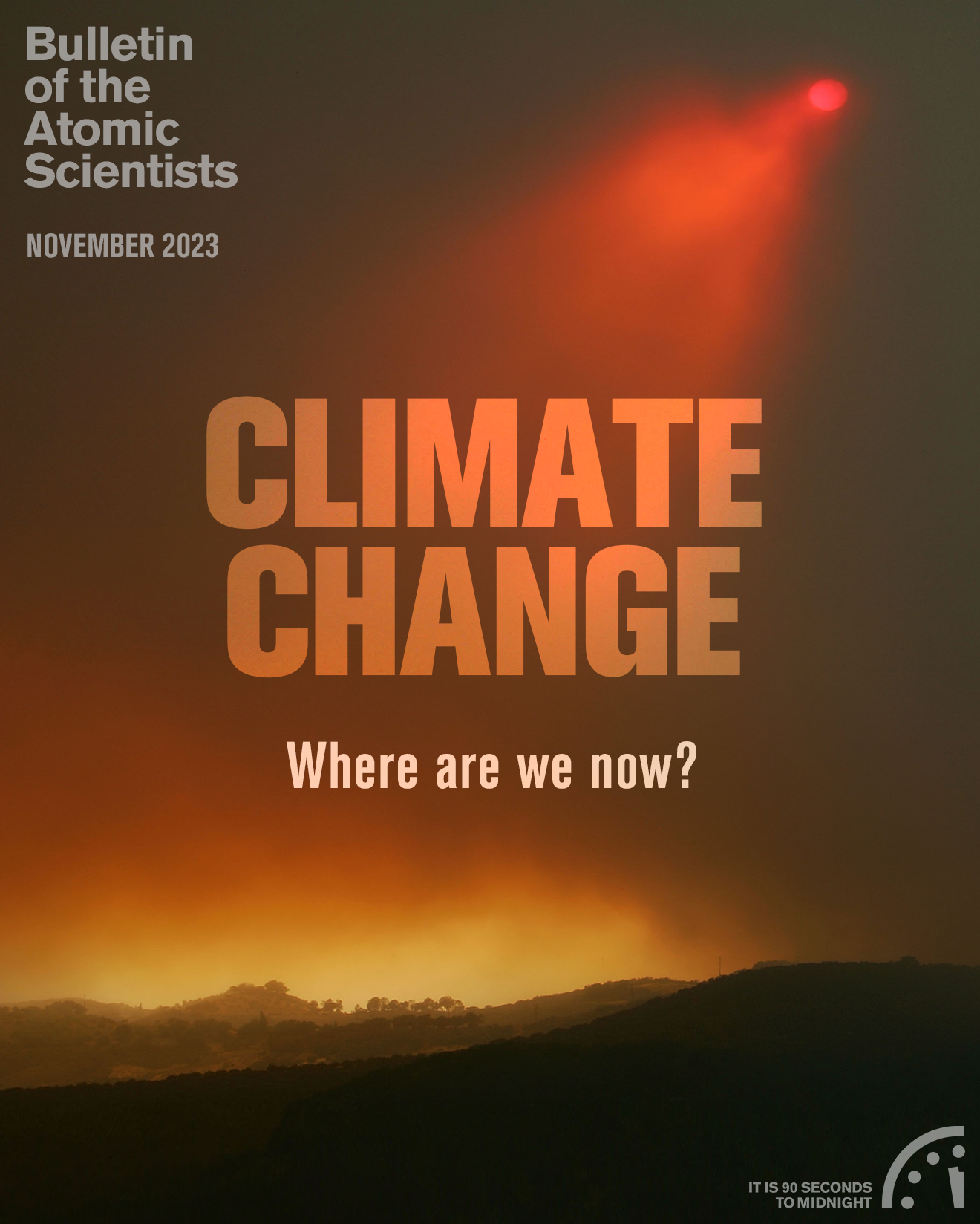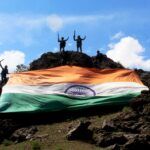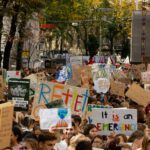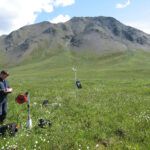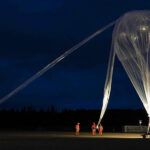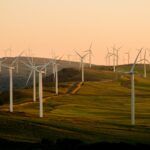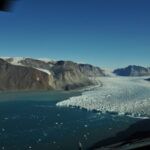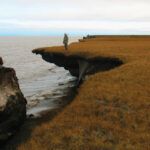“Like writing the biography of a ghost”—Interview with Jeff Goodell, author of The Heat Will Kill You First
By Dan Drollette Jr | November 8, 2023
“Like writing the biography of a ghost”—Interview with Jeff Goodell, author of The Heat Will Kill You First
By Dan Drollette Jr | November 8, 2023
On July 11, author Jeff Goodell published his book on climate change—his fourth on the topic. Titled The Heat Will Kill You First: Life and Death on a Scorched Planet, the book humanizes the concept of global warming with eye-opening facts about the individuals who have already been affected by it, and is full of unknown or easily overlooked information. (For example, extreme heat kills nearly twice as many people worldwide per year as guns, a factoid which seems pertinent, since Tuesday, July 4, was the hottest day on Earth since records began, according to the Washington Post.)
A contributing editor at Rolling Stone since 1995, Goodell has written hundreds of pieces for the magazine, along with books on subjects ranging from what it was like to grow up in Silicon Valley to the rescue of people trapped in a coal mine in Pennsylvania. But he keeps coming back to climate change.
In this interview, Goodell describes what drew him to write a scary, entertaining, and thoroughly researched book about the hotter world humans now face. As University of Wisconsin-Madison geology professor Andrea Dutton said: “You may never see a hot summer day the same way again.”
(Editor’s note: This interview has been condensed and edited for brevity and clarity.)

Dan Drollette: Climate change has been an interest of the Bulletin going back decades; it was a cover story back in 1978. But I’ve never seen the issue handled quite the way as in your book, The Heat Will Kill You First: Life and Death on a Scorched Planet. How do you explain the book’s approach when you bump into someone and have 30 seconds to explain its content?
Jeff Goodell: You mean, what is my “elevator pitch”—as the publishing industry calls it? This book is about redefining our understanding of heat and the risks and dangers of heat—both to ourselves and to all kinds of living things on the planet.
Drollette: The introduction says that you want people to think about heat as more than just a change of a few degrees on a thermometer—you treat heat as almost a living force.
Goodell: Well, the book was born on a 115-degree day in Phoenix when I was staying downtown and had to walk 15 blocks to a meeting. By the time I got there my heart was pounding and I was feeling dizzy. I realized, “Wow, this heat is dangerous.”
Now, that may seem very self-evident. But at the time, I had been covering climate change for 15 years but had never really thought about it in intimate, human terms. I mean, it’s not like a chunk of ice falls off the Thwaites Glacier in Antarctica and that makes somebody drown in Miami Beach.
So, one of the things that drew me to the topic was how to treat heat as sort of the exact opposite.
Drollette: Can you explain?
Goodell: Heat is this sort of invisible force that we tend to overlook. We can’t see it, we can’t hear it, it’s invisible. But it has real material impacts—heat can bend railroad tracks, for example. And this book is about what that kind of extreme heat does to living things, and what it does to our ability to live within thermal limits.
And so this approach was the opposite of an earlier book of mine on sea level rise. And that’s what attracted me to the subject matter: What climate change in the form of extreme heat means to living things.
And the other thing that attracted me to the idea was that—as a result of that walk in Phoenix—I realized that I had not really thought about heat as something that could kill me: If I’m in the wrong place on the wrong day, I could end up dead.
I realized that even though I’ve been writing about climate change for 10 or 15 years, I didn’t really know what heat was. I knew what temperature was, but if someone had asked me to explain in 20 words or less what heat is, I would have had no idea.
And I don’t think that’s just me. I often ask this question in book talks and readings, and most people have no idea what heat is. And so that made it interesting for me—exploring this idea of heat.
Drollette: I noticed the book does not follow a single character throughout, from start to finish. In other words, there is no one hero with a narrative arc, which the book industry is predisposed to. Instead, it’s the story of an idea, isn’t it?
Goodell: Right. And that was one of the major challenges.
This book was very difficult to write because it didn’t have a single person to follow in a narrative. It’s a narrative book, but it doesn’t have the luxury of a single character that I could follow through. And it’s also about something that is, as I said, invisible.
It’s like it’s the biography of a ghost. And that made it both interesting and challenging; it was difficult to do.
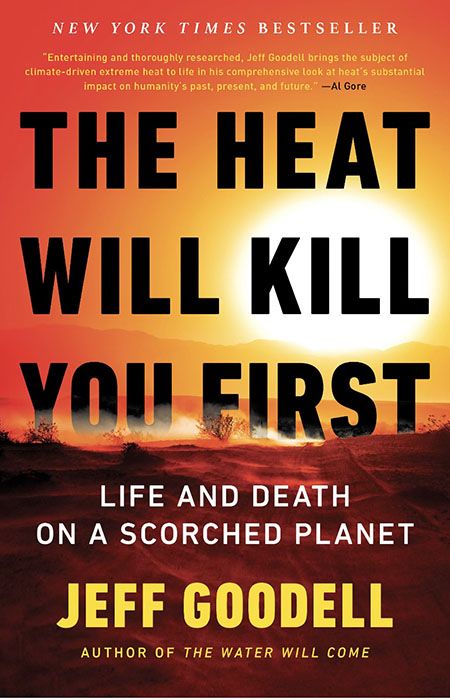
Drollette: How did you solve it?
Goodell: By treating the topic as a kind of collection of short stories, each with their own lead characters—whether it’s the chapter about Sebastian Perez, the farm worker who dies in the fields from extreme heat, or Friederike Otto, the climate scientist who’s looking at attribution science and how we can tell that heat waves are caused by rising carbon dioxide levels or the Gerrish family in the opening chapter who all die on a hike in California. (And they were all healthy, young, fit individuals, I might add.)
I mean, I really did think about character and narrative, but more in the sense of a collection of short stories about a subject.
Drollette: Still, it must have been a difficult sell to nonfiction book publishers: Here’s an invisible threat, explained in an unconventional format.
Goodell: I guess one of the things that gave it impact was that it’s about human mortality. Another was that it’s immediate—this is happening now. I think people are more aware of this than they would have been 20-odd years ago.
And it didn’t hurt that the book came out in the middle of the summer. As you know, this July was the hottest month that humans have ever recorded; we’ve had extreme heat waves all around the world. So, the timing for the book was really great. And in an odd way, it’s sort of a vindication of procrastination: If I had been a more disciplined writer, it would have come out too early.
Because I do think that now people are starting to grasp the the real-time impacts of climate change. It is no longer a story of something that will happen in the future, it’s happening now.
Think about it: We’re seeing wildfires all around the world; Maui happened just recently, there have been those tremendous forest fires in Canada, and heat waves everywhere.
I think that people are wondering what is going on. And they’re starting to figure out that this is not some so-called “Chinese hoax” or some conspiracy that George Soros has put together to control the freedoms of people in democracies—or whatever the conspiracy theory of the month is. Instead, people can see for themselves that this is real, and it’s happening now. And I think they’re starting to ask themselves: “What the hell am I going to do about it?”
Drollette: On the other hand, I remember hearing the speaker at an environmental journalism conference a few years ago warn about the danger of falling into the trap of thinking “it’s just too expensive and too late to do anything, so let’s just give up and party on.”
Goodell: I don’t think there’s going to be some kind of collective awakening. I think that this is trench warfare, in which we’re dealing with conflicting motivations and understandings—especially now with the kind of partisan politics we see in the United States. There’s a certain segment of the population that is never going to come around; no kind of scientific evidence is ever going to convince them. This has become a culture war issue now.
And the stakes are huge: Fifteen years ago, I was talking to Al Gore, and he told me that everybody who cares about climate change has a moment when they realize the sheer scope and scale of what this all is—that climate change is not just about a change of a few degrees temperature, but a fundamental reworking of the operating system of the planet.
And so it’s a question of how do you configure the politics of action without full consensus?
Drollette: Do you think that much of that impasse is due to the disinformation efforts of the fossil fuel industry?
Goodell: I do think the industry bears a lot of responsibility here because they’ve spent decades and billions of dollars to spread disinformation—and using their political power and political influence to slow down, reshape, or kill legislation that would impinge on the consumption of fossil fuels. So I certainly feel it’s completely appropriate to point our fingers at them and say that they have been bad actors. I don’t buy their argument that “We need fossil fuels to keep civilization going.” No, we don’t.
And we could be making this transition a lot faster, with a lot more urgency, if it wasn’t for the disinformation and the financial and political drag of the fossil fuel industry.
This partisan divide that we have now is so damaging because it makes it so difficult to get any kind of legislation through; climate denial has become this sort of cultural litmus test. And evidence to the contrary doesn’t matter to the true disbelievers—which to me is really disturbing, from the point of view of someone who believes deeply in science. We can’t solve these kinds of problems without a common fundamental understanding of science, and the acceptance of science as a fact-based reality.
Drollette: Did you ever want to be a scientist? The reason I ask is because of all the book’s anecdotes about the mechanisms that animals use to cool themselves under normal conditions: Lions climb trees, rabbits send more blood to their ears, hippos wallow in mud, termites build this system of air pockets in their mounds, and so forth. I found myself really caught up in those details—but also wondering if you secretly wanted to be a biologist.
Goodell: (Laughs.) I know what you mean; I suppose that in some way you could say that my whole writing career is about exploring the sciences: It’s the only thing I want to write about. But the answer to your question is ultimately “No”—I never did, in any kind of explicit way, want to be a scientist. I never considered that in college or anything.
Instead, I see my role as being an intermediary—the one who gets to explain the science to everybody else. And I feel that’s a very privileged role, and one that I really love doing.
Drollette: I’d like to go back to something we just sort of skimmed over. You said that we tend to ignore heat; we don’t realize what a role it plays. Do you think it would help if weather forecasters named heat waves like we name hurricanes? Like if they said “Heat Wave Bob will be descending on Phoenix, Arizona, and you can expect temperatures of X degrees”?
Goodell: Well, I wrote about that some in the book. And some people have said that the most effective naming system would be something like “Heat Wave ExxonMobil”—that would really get attention. But yeah, I think that naming and ranking heat waves is a really good idea. The question is, how to do it in the right way?
Because with hurricanes, for example, it’s pretty straightforward—you just go by windspeed. So you know, 74 to 95 miles per hour is Category 1, 96 to 110 miles per hour is Category 2, and so on.
But with heat, it’s more complicated, because humidity adds complexity to it: 110 degrees in the really humid Philippines is very different from 110 degrees in the very, very dry Mojave Desert. So a simple temperature threshold is difficult; it would have to be custom-tailored to each particular place.
So it’s a little more complicated than hurricanes. But I do think that we need to try this stuff because people just don’t understand heat, they don’t understand the risks. And part of this is because it’s really hard to tell what you’re dealing with just by looking.
To give you an example, I’m looking out my window right now, in my office here in Austin, and I cannot tell if it’s 70 degrees or 113 degrees outside; it looks exactly the same—there are no visual clues. But if I look out my window, and the wind is blowing five miles an hour, it looks very different than when the wind is blowing 50 miles an hour, right? There would be tree branches flying everywhere.
We really need to begin to communicate the dangers of extreme heat—and what to do on these kinds of extreme days—in our choice of articles, in our efforts at communicating, and even in our choice of individual words and phrases. For example, [UN Secretary-General] Antonio Guterres recently used the phrase “global boiling” in an attempt to stretch language to communicate the reality of what’s going on. I think that there are better phrases—and worse ones—but what’s more important is communicating the scope and scale of what’s happening.
We need to get away from just using flat, descriptive terminology like “The planet’s gonna warm 1.5 degrees Celsius,” and instead get into what that means for people. That means choosing specific anecdotes, specific things that happened, under these really extreme heat conditions.
Drollette: Speaking of which, there was one really gruesome anecdote in the book that I can’t get out of my mind—the piece about this elderly person living just under the zinc-lined roof of an apartment in Paris during an extreme heat wave, who was more or less cooked to death, and then her body was not found for a long time. And then the person living in the apartment below found all these bodily fluids dripping from the ceiling for like weeks or months. It was gross, and I kind of hate to bring it up. But it did bring home how awful extreme heat can be.
Goodell: Well, sometimes the truth is awful. And as a writer, you have to decide, “What am I trying to describe here? What illustrates it best?” Because I do think that I work really hard in this book to tell stories, not just regurgitate data. I think that my goal is to write very human, very moving stories that are underpinned by an understanding of the science, but do not require the reader to understand the nuances of the science to understand the story. So, in choosing stories like these, I wanted to talk about what death looks like under conditions of extreme heat.
You know, 60,000 people died in Europe last summer from heat, and I’m sure the number this summer will be much higher. So, what does that look like? I mean, the phrase “60,000 people” is so easy to say, but it’s ultimately just a statistic.
I think most people don’t have any understanding of what it means to die from extreme heat. And mortality is really the subject of this book. In some way, I really want to make that feel visceral. And so that particular anecdote in Paris was just one that I came across that was particularly vivid, that had witnesses who could talk about it.
A similar thing occurred in choosing to write about that California family who died on a hike—the story in the opening chapter. I thought it was a powerful story because they were kind of everyday people who were in good shape. And you could relate to them, you could picture yourself, as a reader, being part of this family—and then this thing happens.
And I think that’s really lacking in a lot of the communication about climate change.
Drollette: Were there any other comments that you wanted to make?
Goodell: If you don’t understand the scope and scale of the loss and suffering that we face, then you can’t understand the scope and scale of the opportunity that we have—and the potential for doing things better. I mean, I grew up in Silicon Valley; I knew Steve Jobs when he was running around barefoot and shouting Bob Dylan lyrics at everybody. Consequently, I’ve always believed in technological change and progress. I kind of grew up drinking that water.
Drollette: Or drinking that Kool-Aid?
Goodell: Yeah. But, you know, I also think that there’s a lot of really dumb optimism out there—or really naive optimism. What I tried to do is find a way to ground that optimism in the grim reality of the moment that we’re in.
Everyone seems to be hoping for some sort of magic box to appear out of nowhere, that will solve all our problems. But time’s running out. And I cannot underscore that more.
Together, we make the world safer.
The Bulletin elevates expert voices above the noise. But as an independent nonprofit organization, our operations depend on the support of readers like you. Help us continue to deliver quality journalism that holds leaders accountable. Your support of our work at any level is important. In return, we promise our coverage will be understandable, influential, vigilant, solution-oriented, and fair-minded. Together we can make a difference.
Keywords: Jeff Goodell, climate change, energy, environment, extreme heat
Topics: Climate Change

